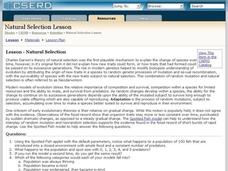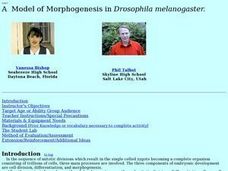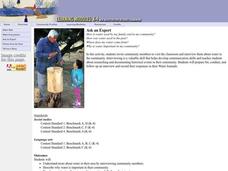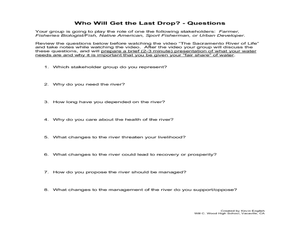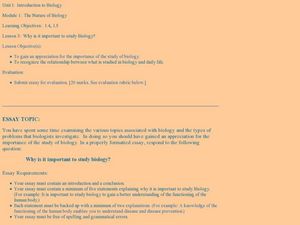Curated OER
Using Ion Exchange Chromatography to Separate Proteins
Students explore protein purification by separating a positively charged molecule, lysozyme, from a negatively charged molecule, albumin, at neutral pH using ion exchange chromatography.
Curated OER
Exploring Organisms
Young scholars investigate various organisms in an attempt to understand the process of evolution and related ecological issues. This elementary activity uses small plastic animals and includes a worksheet for student assessment and...
Curated OER
Exploring Molecules
Students explore the process of science by studying and analyzing fundamental biological molecules in this introductory lesson on molecules. The lesson includes a pre-lesson worksheet and a question sheet for final, individual assessment.
Curated OER
Who Works in This Forest?
Students examine the variety of jobs that are related to working in the forest. Information on the different jobs is provided in this lesson plan for the teacher to share with the students. The students create a collage using magazines...
Curated OER
Soil, Forest, and Land Conservation
Students discuss the demands on the rainforest and devise a management plan that satisfies competing uses. They then construct a diorama to show the location of the various sites.
Curated OER
Biology: Natural Selection
Students explore evolutionary processes and theories using the spotted fish applet. They observe what happens to fish in a closed environment with both food and predators. Students run the model several times and answer questions about...
Curated OER
A Model of Morphogenesis in Drosophila Melanogaster
Learners investigate the following scientific terms and ideas: rates of diffusion, the role of morphogens in the development of larva, the chemical dynamics of a cell, and the significance of embryo polarity during development.
Curated OER
Point of View and Scientific Truth
Young scholars investigate the mystery of the "destructive force." They explore the concepts of natural phenomena. Students discuss the limited aspects of natural phenomena and the "whole truth" to generate new hypotheses that can be...
Curated OER
Protoplast Production (Plant Cells Without Walls)
Students explore the spherical protoplasts of plants. Students observe that plant cells have a plasma membrane in addition to the cell wall. Students plasma membranes, solutes and organelles.
Curated OER
Water: The Liquid of Life
Sixth graders complete a lesson on the properties, types and amounts of water on Earth. In groups, they travel between stations to identify water resources in Illinois and pollution sources. They complete the lesson with a field trip...
Curated OER
Ask An Expert
Young scholars invite community members to visit the classroom and interview them about water in the community. Students prepare for, conduct, and follow up an interview and record their responses in their Water Journals.
Curated OER
Life's Big Questions: Where Did Life Come From?
Young scholars explore the life forms that live in the hot springs of Yellowstone. They examine how microscopic creatures can survive in these extreme conditions. Students perform experiments to observe growth samples and demonstrate...
Curated OER
Mother's Day Wampum Beads
Sixth graders research the historical significance of Mother's Day and the cultural background of Wampum Beads. They create colorful Mother's Day gifts. They increase their knowledge of color theory.
Curated OER
BUGS-INSECTS
Students participate in a theme study while teaching primary students basic skills according to Individual Education Plan (IEP) goals in Reading, Math, and Writing. The lesson plan is concerned primarily with the concept of insects.
Curated OER
Live Well Now to Live Longer Later
Ninth graders select a topic to research, completing the sentence, "Are the effects of _______ really that detrimental to one's health?" They record information in a journal, including sources of information. Students work in groups with...
Curated OER
Jobs and Places
Students match a job to where this job would be performed. In this jobs and places lesson plan, students have to decide where a certain job would be performed by filling out a worksheet and drawing a symbol to match each place.
Curated OER
Issues in Genomics
Students explore the definition of ethics and genomics. In this organism lesson plan students participate in the chosen teacher lesson plan.
Curated OER
Who Will Get the Last Drop?
Students discuss the importance of California's water system. In this earth science lesson, student play the role of different stakeholders. They present a 2-3 minute argument on their group's perspective about their need for water.
Curated OER
Genetics and Molecular Biology
Students create DNA models using colored construction papers. In this biology lesson, students identify enzyme restriction sites. They model how DNA plasmids replicate when taken up by a bacterial cell.
Curated OER
Variation in Human Skin Color
Students classify themselves according to the six skin types. In this biology lesson, students explore the causes of human skin variation. They present their findings in class.
Curated OER
Why is it important to study Biology?
Students study the importance of biology. In this biology lesson students write an essay on biology and its importance.
Other popular searches
- Famous Biologists
- Marine Biologists
- Famous Cell Biologists
- Wildlife Biologist
- Early Biologist
- International Biologist
- Biologists Past and Present
- Research a Biologist
- Biologists Alive
- Native American Biologist
- Cell Biologists
- Biologist Trading Cards







